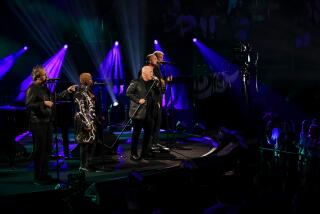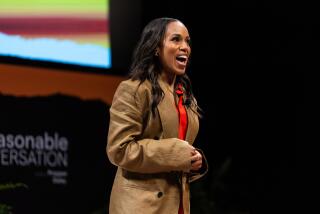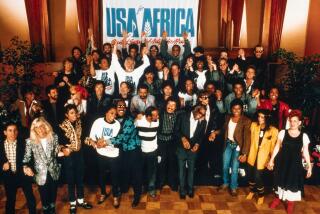At ‘One World’ concert, earnestness, uplift and even some glorious showbiz artifice

- Share via
One sign you’re a superstar: Even in lockdown, you can find somebody to haul your grand piano out to your driveway.
That was the setup for Elton John’s performance on Saturday’s “One World: Together at Home” special, which had the veteran entertainer barrelling his way through a growly “I’m Still Standing” — its lyric of romantic perseverance newly applicable to a global health crisis — on the leafy grounds of what appeared to be his estate in Beverly Hills.
But if John was flexing his celebrity status, the tableau was also endearingly relatable: Look past his pink sunglasses and perfect coif and behind him you could see a couple of basketballs presumably left outside by the singer’s stir-crazy sons.
Presented by the prominent aid organization Global Citizen, “One World: Together at Home” — with appearances by acts including Taylor Swift, Billie Eilish, Paul McCartney, Jennifer Lopez, the Rolling Stones and Lady Gaga, the last of whom was credited as the show’s curator — offered a novel mix of coziness and splendor.

The coziness, of course, we’ve grown accustomed to in the weeks since the COVID-19 pandemic shut down the live-music industry and turned even A-list stars into sweatpants-wearing livestreamers. Yet “One World” was aiming higher than similar specials organized recently by the likes of James Corden, iHeartMedia and the Academy of Country Music.
Broadcast on CBS, NBC and ABC — and co-hosted by the three networks’ flagship late-night personalities: Stephen Colbert, Jimmy Fallon and Jimmy Kimmel — the two-hour show displayed some “We Are the World”-style ambition as it corralled many of pop’s biggest names to celebrate healthcare workers and raise money for the World Health Organization. (After the program, during which ordinary viewers were advised to put away their wallets, Global Citizen said it had secured commitments of $127 million from corporations and philanthropists.)
As in other specials, artists performed from living rooms, backyards or rehearsal spaces; most were alone to help emphasize the importance of social distancing. But here the production value got an obvious boost, as when Keith Urban convened a trio of selves to add harmony and counterpoint to his zippy rendition of Steve Winwood’s “Higher Love.” (As Urban’s digital tricknology made clear, the performances on “One World” were taped in advance.)

Lopez, sitting outside in a nest of candles and twinkle lights, deployed professional-grade lighting and camerawork — not to mention pro-grade hair and makeup — in a dazzling take on Barbra Streisand’s “People” that felt like a welcome visitation from the Before Times, when a great star turn could invite you to an elevated plane.
Then there were the Stones, each in his own quadrant of a four-way split screen, somehow making the best of a goofy video-conferencing app to play “You Can’t Always Get What You Want.” The selection was surprising, given the song’s elaborate choral part — hardly reproducible via Zoom — as well as President Trump’s use of it at his rallies, which the Stones have repeatedly denounced. But even with a winking Charlie Watts on air drums, the song felt alive in a way few acts ever manage to do on TV. It was also a reminder, here in the age of perpetual earnestness, that silliness — even show-biz fakery — contains real emotional value.

The gesture toward Trump wasn’t the only moment of the show touched by politics. Though Global Citizen’s CEO, Hugh Evans, said beforehand that he wanted “One World” to be “apolitical,” several artists took advantage of the highly visible platform to speak truth to power.
McCartney introduced a funky, stripped-down “Lady Madonna” by urging viewers to demand that leaders strengthen health systems around the world. Swift seemed to channel a bit of anger about how the coronavirus has been handled in “Soon You’ll Get Better,” a song about her mother’s experience fighting cancer that here took on a wider meaning about access to testing and medicine.
And Beyoncé and Alicia Keys, both of whom spoke but didn’t sing, called attention to the disturbing fact that African Americans are suffering in disproportionate numbers as a result of decades of healthcare inequality.

Stevie Wonder built that awareness into his performance, which expertly combined “Lean on Me” by Bill Withers, who died last month, with his own “Love’s In Need of Love Today,” about an unflagging determination to defeat hate. Ditto Lizzo in a churchy rendition of Sam Cooke’s “A Change Is Gonna Come” that traded her usual good cheer for steely conviction.
Some artists plumbed their catalogs to find a sensitive song to retrofit: Kacey Musgraves’ “Rainbow,” for example, or “Wake Me Up When September Ends” by Green Day’s Billie Joe Armstrong. Others retrieved oldies with potential to inspire, such as Charlie Chaplin’s “Smile,” which Lady Gaga gave a full-throated reading in keeping with her show-stopping “La Vie En Rose” from “A Star Is Born,” and “Sunny,” the mid-’60s Bobby Hebb tune in which Eilish found some promise of better times ahead.
Shawn Mendes and Camila Cabello took up “What a Wonderful World” for the same reason, intertwining their voices as they cuddled on a piano bench, not six inches (never mind the recommended six feet) from each other.
Another instance of celebrity exceptionalism? Sure. But the sight also demonstrated how small some of our dreams have become.
More to Read
The biggest entertainment stories
Get our big stories about Hollywood, film, television, music, arts, culture and more right in your inbox as soon as they publish.
You may occasionally receive promotional content from the Los Angeles Times.











